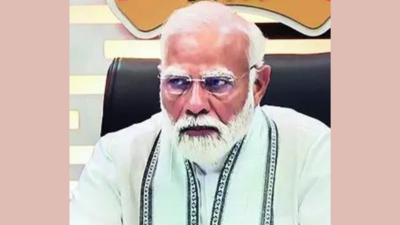With Israel launching an unprecedented attack on Iran, India was forced to do another delicate balancing act in its response to the dramatic escalation in West Asia as it underlined the importance of dialogue and diplomacy in resolving underlying issues and offered support for de-escalation efforts.
PM Narendra Modi said in a post on X he received a call from his Israeli counterpart Benjamin Netanyahu who briefed him about the evolving situation. “I shared India's concerns and emphasized the need for early restoration of peace and stability in the region,’’ said the PM.
Citing its close and friendly relations with both countries, the Indian government said in a formal response it stood ready to extend all possible support. The ministry of external affairs said India is closely monitoring the evolving situation, including reports related to attacks on nuclear sites. “We are deeply concerned at the recent developments between Iran and Israel,” said the government, urging both sides to avoid any escalatory action. Existing channels of dialogue and diplomacy should be utilised to work towards a de-escalation of the situation and resolving underlying issues, it added.
Israel Launches Air Strikes on Iran, Tehran Hits Back With Vengeance: Experts React on What's Next
The government also advised Indian nationals in the region to exercise caution, stay safe and follow local security advisories. There are roughly 10,000 Indian nationals in Iran.
Describing Iran as the primary state sponsor of terrorism, Israel launched strikes apparently to eliminate the nuclear threat from Iran. Tehran has vowed threatening “severe punishment”.
While Israel sees Iran as a principal backer of terrorism, Modi has himself in the past underlined the significance of India’s partnership with Iran in trade and investment, connectivity, energy and counterterrorism. The 2 countries have also worked together to ensure Afghanistan is not used as a terrorism launch pad.
The latest upheaval in West Asia and the risk of a full-blown regional conflict is likely to test Indian diplomacy again as the Arab world, including key partners like the UAE and Saudi Arabia, strongly condemns Israel’s attacks. While maintaining India’s solid defence and security partnership with Israel, PM Narendra Modi has himself worked to nurture ties with several GCC countries which together remain the most important source of energy security for India.
In case of a war, India’s primary responsibility will be to ensure the safety and security of the almost 9-million strong Indian expatriate community in the region who have together been the largest source of remittances for the country. The government has so far not asked Indian nationals to leave the conflict zone. A continued conflict will also call into question initiatives like the transformative India-Middle East- Europe Economic Corridor, and I2U2 that involves India, Israel, the US and UAE.











